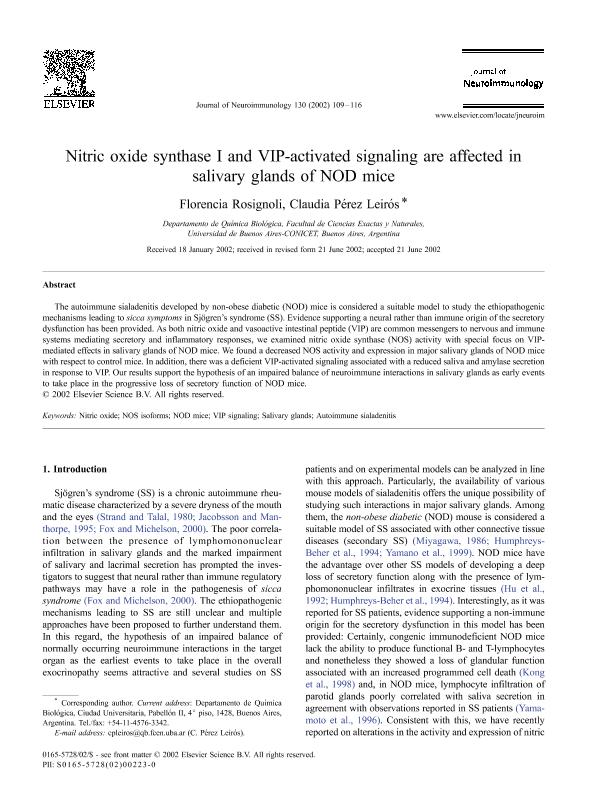Artículo
Nitric oxide synthase I and VIP-activated signaling are affected in salivary glands of NOD mice
Fecha de publicación:
06/2002
Editorial:
Elsevier Science
Revista:
Journal of Neuroimmunology
ISSN:
0165-5728
Idioma:
Inglés
Tipo de recurso:
Artículo publicado
Clasificación temática:
Resumen
The autoimmune sialadenitis developed by non-obese diabetic (NOD) mice is considered a suitable model to study the ethiopathogenic mechanisms leading to sicca symptoms in Sjo¨gren’s syndrome (SS). Evidence supporting a neural rather than immune origin of the secretory dysfunction has been provided. As both nitric oxide and vasoactive intestinal peptide (VIP) are common messengers to nervous and immune systems mediating secretory and inflammatory responses, we examined nitric oxide synthase (NOS) activity with special focus on VIPmediated effects in salivary glands of NOD mice. We found a decreased NOS activity and expression in major salivary glands of NOD mice with respect to control mice. In addition, there was a deficient VIP-activated signaling associated with a reduced saliva and amylase secretion in response to VIP. Our results support the hypothesis of an impaired balance of neuroimmune interactions in salivary glands as early events to take place in the progressive loss of secretory function of NOD mice.
Palabras clave:
NOD mice
,
VIP signaling
,
salivary glands
,
Autoimmune sialadenitis
,
Nitric oxide
Archivos asociados
Licencia
Identificadores
Colecciones
Articulos(IQUIBICEN)
Articulos de INSTITUTO DE QUIMICA BIOLOGICA DE LA FACULTAD DE CS. EXACTAS Y NATURALES
Articulos de INSTITUTO DE QUIMICA BIOLOGICA DE LA FACULTAD DE CS. EXACTAS Y NATURALES
Citación
Rosignoli, Florencia; Perez Leiros, Claudia; Nitric oxide synthase I and VIP-activated signaling are affected in salivary glands of NOD mice; Elsevier Science; Journal of Neuroimmunology; 130; 6-2002; 109-116
Compartir




